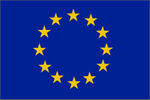European Commission
 | |
| Industry: | Government |
| Founded: | 1958 |
| Headquarters: | Brussels |
| Country: | Belgium |
| Employees: | 25,000 |
| Website: | ec.europa.eu |
| Facebook: | EC Facebook |
| LinkedIn: | EC LinkedIn |
| Twitter: | |
| Key People | |
| Jose Manuel Barroso, President | |
EC stands for the European Commission or the European Community. It is an executive body of the European Union, which proposes legislation to the Council and the Parliament and administers and implements legislative EU policies and enforces EU law jointly with the Court of Justice. It represents the general interests of Europe as a whole.[1][2]
Structure of the European Commission[edit | edit source]
The EC is comprised of a College of Commissioners. One Commissioner per member state is appointed within the College of Commissioners. The Commissioners of each member state are responsible for representing the interests of the entire European Union (EU).
The EC is divided into several services and departments known as the Directorates-General or DGs. These DGs are classified based on the policies with which they deal, usually issues that have a specific mandate or are mostly administrative. For instance, creating statistics or to detect fraudulent activities.
Role of the European Commission[edit | edit source]
The EC is responsible for drafting proposals for new EU laws. It also manages the daily business of implementing the policies of the EU and allocates the EU funds. The EC also sees to it that no one violates European laws and treaties.[1]
The working of European Commission[edit | edit source]
The EC is highly active and addresses all key issues concerning the European Union by formulating and bettering various policies in areas such as agriculture, transport, energy and natural resources, the economy and finances, external relations and foreign affairs, culture, education and youth, business, cross-cutting, climate action, and others. [3]
European Commission and ICANN[edit | edit source]
In 2009, with ICANN’s original U.S. led contract ending in September, the EC appealed for international involvement in carrying out ICANN's responsibilities. At that time, ICANN was more of a private firm that ultimately answered to the US Government's Department of Commerice. The EC explained that the management of the Internet, which had become a vital part of the global economy and tool for worldwide communications, should not be assigned to a single country.[4]
In a paper titled "Internet Governance: Next Steps," the EU proposed that ICANN be handled by private bodies without any government intervention in its day-to-day activities, instead being governed according to the principles agreed upon by public authorities. The EC also called for international talks on Internet governance, realizing that the next billion internet users would come mainly from the developing world.[4]
On September 30th, 2009, US government declared that ICANN would be governed by international parties. From then onwards, ICANN has been subject to independent review panels appointed by ICANN's Governmental Advisory Committee (GAC) and not solely to the review of US Department of Commerce (DOC). Viviane Reding, the EU's Commissioner for Information Society and Media, welcomed the US administration’s decision, and said that "Internet users around the world can now anticipate ICANN’s decision as more independent and accountable."[5]
6 Policy Papers of 2011[edit | edit source]
At the end of August, 2011, Kieren McCarthy of .nxt leaked 6 papers written by the EC regarding their take on ICANN; the papers came on the heels of a number of brash encounters between the EC representative, Gerard de Graaf, and other ICANN participants at ICANN 41 in Singapore.[6] His behavior had some wondering how well he was representing the entire membership of the European Union, and struck many as blatantly rude. At one point during the discussions between the GAC and the ICANN Board, Mr. de Graaf grew so frustrated that he was audibly pounding on the table and wondered aloud whether he was talking "to the deaf or stupid".[7][8] The board was discussing how to handle trademark issues with regards to the new gTLD creation process, and Mr. De Graaf was frustrated that the E.U.'s trademark policy would not be implemented in this circumstance.[9]
The papers themselves largely propose subordinating ICANN as an entitled policy-making body. Many see the publication of the papers as a response to the aforementioned dismissal of GAC recommendations by the ICANN board at ICANN 41.[10] The papers take issue with a range of ICANN decisions and policies; from how they staff the organization, to the new gTLD program, to their handling of ccTLDs; as a whole they have been taken as a full assault on the organization's independent legitimacy, and its multi-stakeholder model.[11]
Paper 1[edit | edit source]
References[edit | edit source]
- ↑ 1.0 1.1 ec.europa.eu Cite error: Invalid
<ref>tag; name "link1" defined multiple times with different content - ↑ europa.euAbout us
- ↑ ec.europa.eu
- ↑ 4.0 4.1 ec.europa.eu
- ↑ eurunion.org
- ↑ Blog.InternetGovernance.org
- ↑ EU Rep Refers to ICANN as Deaf or Stupid, InternetNews.me
- ↑ Blog.InternetGovernance.org
- ↑ ICANN-GAC Session Marred by Name Calling Disagreement, TheDomains.com
- ↑ Whore Wrote these ICANN Papers Anyway European Commission, circleid.com
- ↑ Blog.InternetGovernance.org
